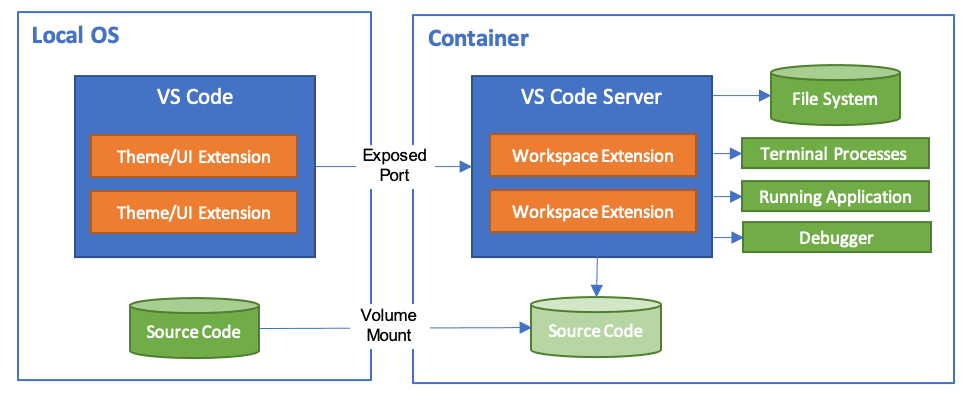Docker¶
Installation¶
sudo apt update
sudo apt dist-upgrade -y
sudo apt install ca-certificates curl -y
sudo install -m 0755 -d /etc/apt/keyrings
sudo curl -fsSL https://download.docker.com/linux/ubuntu/gpg -o /etc/apt/keyrings/docker.asc
sudo chmod a+r /etc/apt/keyrings/docker.asc
echo "deb [arch=$(dpkg --print-architecture) signed-by=/etc/apt/keyrings/docker.asc] https://download.docker.com/linux/ubuntu $(. /etc/os-release && echo "${UBUNTU_CODENAME:-$VERSION_CODENAME}") stable" | sudo tee /etc/apt/sources.list.d/docker.list > /dev/null
sudo apt update
sudo apt dist-upgrade -y
sudo apt install docker-ce docker-ce-cli containerd.io docker-buildx-plugin docker-compose-plugin docker-doc -y
Setup¶
sudo groupadd docker
sudo usermod -aG docker $USER
Hello World¶
docker run hello-world
Visual Studio Code¶
Requirements¶
- Extensions
(Ctrl+Shift+X | File Preferences
Extensions)
- ms-azuretools.vscode-containers
- ms-azuretools.vscode-docker
- ms-vscode-remote.remote-containers
Container Tools¶
- Container Tools extension menu in the primary side bar (Ctrl+B) makes it easy to build, manage, an deploy containers
- Container Explorer facilitates the management of container assets (containers, images, volumes, networks)
See more information on Containers in Visual Studio Code.
Developing inside a Container¶

Source: https://code.visualstudio.com/docs/devcontainers/containers
- Setup a
devcontainer.jsondev container configuration file for your project, either located under.devcontainer/devcontainer.jsonor as a.devcontainer.jsonfile (note the dot-prefix) in the project root - Use the command (Ctrl+Shift+P
>dev containers reopen) Dev Containers: Reopen in Container to connect with Visual Studio Code and start developing within the container
Example
docker-compose.yml
services:
ubuntu24:
image: ubuntu:24.04
container_name: ubuntu24
volumes:
- ./shared_data:/home/ubuntu/shared_data
tty: true
- Create a container based on the image from Ubuntu 24.04 LTS
- Link the folder
shared_datapresent in your project's root directory to the folder/home/ubuntu/shared_datainside the container
.devcontainer/devcontainer.json
// For format details, see https://aka.ms/devcontainer.json. For config options, see the
// README at: https://github.com/devcontainers/templates/tree/main/src/docker-existing-docker-compose
{
// Name for the dev container. This is displayed in the VS Code UI.
"name": "Example Dev Containers with Docker Compose",
// Update the 'dockerComposeFile' list if you have more compose files or use different names
"dockerComposeFile": [
"../docker-compose.yml"
],
// The 'service' property is the name of the service for the container that VS Code should use from the compose files.
// Update this value and .devcontainer/docker-compose.yml to the real service name
"service": "ubuntu24",
// The optional 'workspaceFolder' property is the path VS Code should open by default when connected.
// This is typically a file mount in .devcontainer/docker-compose.yml
"workspaceFolder": "/home/ubuntu/shared_data/",
// Features to add to the dev container. More info: https://containers.dev/features.
// "features": {},
// Use 'forwardPorts' to make a list of ports inside the container available locally.
// "forwardPorts": [],
// Uncomment the next line if you want start specific services in your Docker Compose config.
// "runServices": [],
// Uncomment the next line if you want to keep your containers running after VS Code shuts down.
"shutdownAction": "stopCompose",
// Command string or list of command arguments to run on the **host machine** during initialization
// "initializeCommand": [
// "echo 'Initializing the dev container...'",
// "echo 'This is a placeholder for any initialization commands you might want to run.'"
// ],
// Uncomment the next line to run commands after the container is created.
// Subsequent commands execute **inside the container** immediately after it has started for the first time
"postCreateCommand": "cat /etc/os-release",
// Configure tool-specific properties.
"customizations": {
"vscode": {
// Uncomment the next line to install VS Code extensions.
"extensions": [
"ms-vscode.cpptools-extension-pack",
"ms-python.python",
"ms-python.debugpy",
"ms-python.vscode-pylance",
"cschlosser.doxdocgen",
"redhat.vscode-xml",
"redhat.vscode-yaml",
"tomoki1207.pdf"
]
// Uncomment the next line to set a specific VS Code version.
// "vscodeVersion": "1.60.0"
}
}
// Uncomment to connect as an existing user other than the container default. More info: https://aka.ms/dev-containers-non-root.
// "remoteUser": "devcontainer"
}
Warning
If you try to remove files inside the shared folder between container and
host machine, the following error may appear: EACCES: permission denied.
This error is due to the changes on the folder's privileges ($ ll).
A solution is to remove the file with sudo, changing back the folder's
privileges, among others.
See more information on Developing inside a Container in Visual Studio Code and Dev Container metadata reference.